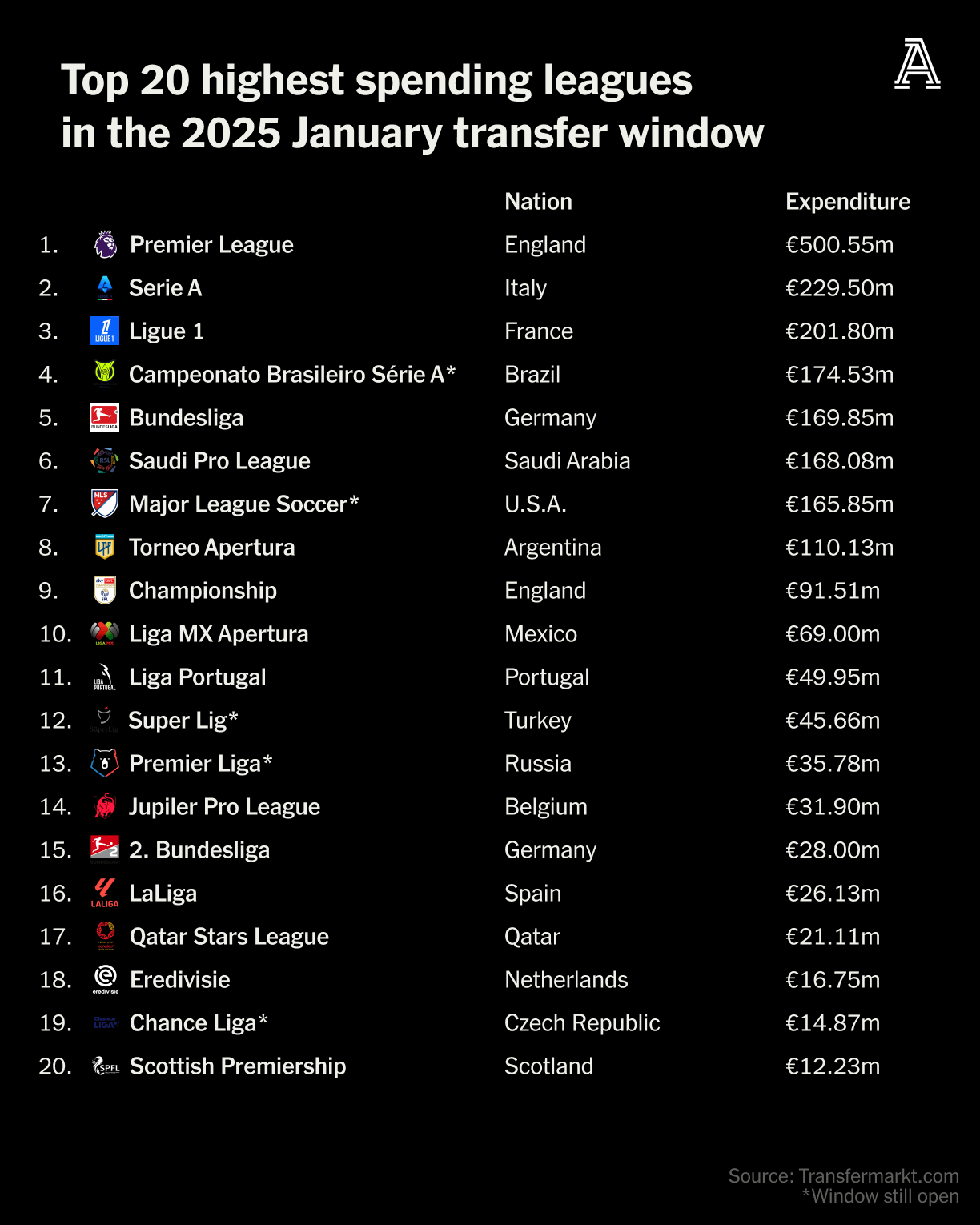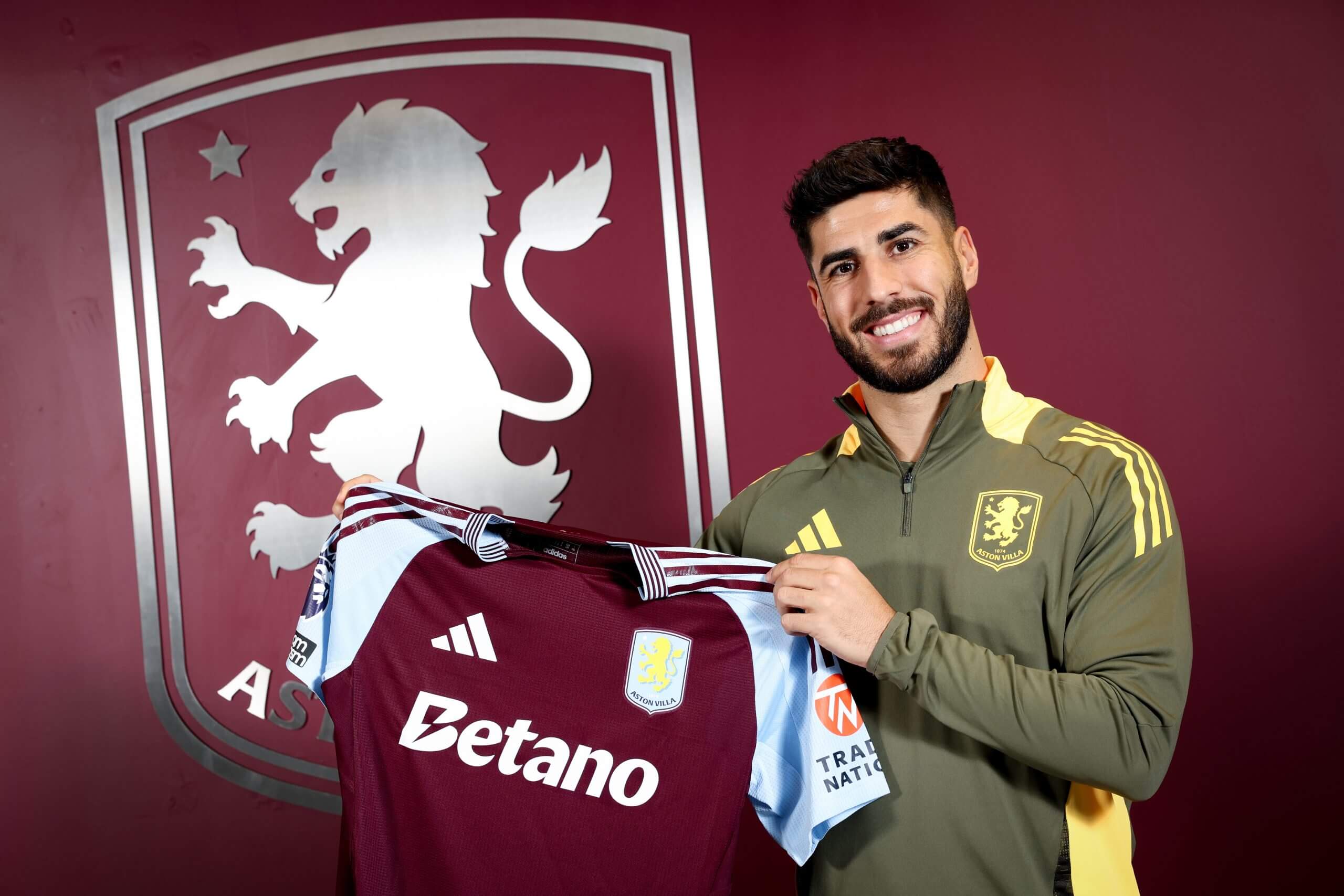The biggest transfer of Spain’s winter market came right as the window was about to close — with Real Betis registering Cucho Hernandez, their new €13million (£10.8m; $13.5m) signing from Columbus Crew, moments before the deadline.
Hernandez will be welcomed at the Benito Villamarin and missed in MLS, but the Colombian striker’s move did not even make the top 25 deals across the top leagues this month, which shows just how quiet — relatively speaking — the January transfer window was across La Liga.
Betis’ last-minute outlay doubled the total spent across all 20 top-flight teams, with the €26.1m collective figure putting them 16th of all global leagues during the window, according to Transfermarkt, one place below the German second division and well behind mid-ranking leagues such as those in Belgium, the Netherlands, Turkey and Russia.

There was none of the shock and awe involved as Manchester City spent £178m in a month to try to arrest their slide as part of a £403m collective spend across the 20 Premier League clubs. Even relegation-threatened Ipswich Town’s €23.7m splurge on Jaden Philogene came close to matching the entire outlay of all 20 Spanish top-flight clubs.
Spain’s January transfer window had begun with a blaze of controversy, with La Liga officially ‘deregistering’ Barcelona’s Dani Olmo and the Catalan club successfully petitioning the Spanish government for an injunction to allow the Spain international to keep playing while a legal conflict is resolved.
On Monday, there was also adjacent drama around Spanish football — as Real Madrid railed against refereeing standards in Spain and La Liga president Javier Tebas and the Spanish federation hit back.
However, it was quieter on Calle Torrelaguna to the east of the city centre, where Tebas was nowhere to be seen, but La Liga had invited media to cover the final hours of the transfer window from a working room on the first floor of their HQ.
Five floors up in the lift, two dozen staff members across La Liga’s dedicated financial control, legal and competition teams were in place to receive notification from Primera and Segunda Division teams of any final deals, meaning they could run the numbers to see if the buying club had sufficient space within their official salary cap to be able to register the new arrival to play.
TV reporters passed the time asking each other — in front of a big screen on which the latest moves were detailed — whether a ‘bombazo’ surprise would happen in the final hours of the window. But there was general agreement among all present, as the complimentary sandwiches and cheese sticks were gobbled up, that nothing huge was going to go down.
⌛ ¡El mercado de fichajes, a punto de llegar a su fin!
📺📻🗞️ Los periodistas están en la sede de LALIGA para hacer una cobertura en directo de todo lo que pueda pasar en estas últimas horas. pic.twitter.com/UEUivTd2gr
— LALIGA Corporativo (@LaLigaCorp) February 3, 2025
There were some interesting late moves for the La Liga staff to process. Girona’s loan signing of Brazilian playmaker Arthur Melo from Juventus is a potential coup. Las Palmas loaned Spain Under-21 midfielder Stefan Bajcetic from Liverpool. Villarreal took Canada international Tajon Buchanan on loan from Juventus. There were two sets of paperwork involved as ex-Spain left-back Juan Bernat’s loan move from Paris Saint-Germain to Villarreal was cancelled and the 31-year-old immediately joined Getafe on a free transfer.
Although there was little of the excitement generated by late moves in other leagues, it is not that La Liga teams are flat broke. Last summer’s collective investment across the 20 Primera Division sides of €557.19m expenditure put them fifth of all world leagues, albeit it was less than a quarter of the €2.33bn spent by the Premier League.
That was also slightly misleading given Real Madrid made last summer’s biggest ‘free’ transfer signing in Kylian Mbappe, meaning a galactico-level signing-on fee and wages for the Frenchman.
January’s lack of spending was still no real surprise given La Liga’s biggest teams had all signalled no business was likely. After all the Olmo drama, Barca concentrated on using any space within their salary cap to renew the contracts of Ronald Araujo, Pedri and Gavi. The Catalan club did meet with Marcus Rashford’s representatives, but no move was seriously explored before Rashford joined Aston Villa on loan from Manchester United.
Real Madrid went into January pretty sure they would not be signing anyone and even Antonio Rudiger’s injury last Saturday — meaning Carlo Ancelotti has zero currently fully fit senior centre-backs — didn’t change the Bernabeu hierarchy’s position. There was contact with Liverpool over Trent Alexander-Arnold, but that seemed more a chess move in their plan to sign the England international on a free transfer next summer, not an actual bid they expected Liverpool to accept mid-season.
It was also very quiet around Atletico Madrid this month — having invested €200m in new players last summer and with no obvious problem areas in Diego Simeone’s current squad.
Betis being the biggest spenders was unexpected given the Seville-based club’s financial position remains delicate. As well as moving for Cucho, they also loaned Antony from Manchester United, taking on much of the Brazilian winger’s substantial wage.

Real Betis made Cucho Hernandez La Liga’s big winter signing (Rich Graessle/Getty Images)
But Los Verdiblancos also sold 19-year-old homegrown winger Assane Diao to Serie A side Como for €12m this January and loaned out three players, including previous first-choice goalkeeper Rui Silva to Sporting CP. This meant they more or less balanced their books.
La Liga’s next biggest spenders were Sevilla, as they continue to rebuild their squad after some windows of stark austerity. The Andalusians (currently 14th in the table) signed Nigerian striker Akor Adams from Montpellier for €5.5m and Swiss attacker Ruben Vargas from Augsburg for €2.5m. Their salary limit was not breached, however, as right-back Gonzalo Montiel was sold to River Plate for €4.5m and Kelechi Iheneacho was loaned to Middlesbrough, with the Championship team covering his salary for the remainder of the season.
Valencia also showed some urgency — perhaps related to having come into the window joint-bottom of the table. Under-fire owner Peter Lim sanctioned three loan signings — striker Umar Sadiq from Real Sociedad, right-back Max Aarons from Bournemouth and attacking midfielder Ivan Jaime from Porto.
The most interesting move of the whole window involving a Spanish club was Manchester City signing centre-back Juma Bah from Valladolid for €6m — with the 18-year-old defender paying his own €6million release clause to unilaterally break his contract and move. Valladolid were especially angry as they had been hoping to get a higher fee for the promising player, who until last summer was playing at club level in his native Sierra Leone.
While everything was generally quiet around La Liga, there were players available who might in other circumstances have been of interest. Ex-Real Madrid winger Marco Asensio was available from PSG, but a return to his former club was never on the cards and no other La Liga team could realistically aim to cover his full PSG wages, as Aston Villa have agreed to from now until June.

Few La Liga teams could realistically cover Asensio’s PSG wages (Neville Williams/Getty Images)
Joao Felix and Alvaro Morata were two other big-name attackers potentially available — but again returns to Atletico Madrid were never on the cards and their status and likely wage demands meant no other La Liga club would be in the running for their signatures.
La Liga club executives and directors have long pointed out in private how difficult it is for any club outside Spain’s top three to compete with most Premier League clubs (including historically smaller spenders, such as Brighton & Hove Albion or Bournemouth) if they both want to sign the same player.
The official word at La Liga HQ on Monday was that Spanish clubs generally do not spend much in January and the way the salary cap system works means clubs usually don’t have much space to fill unless they sell first. Players currently coveted by Premier League’s richest clubs — such as Athletic Club’s Nico Williams and Real Sociedad’s Martin Zubimendi — were happy to stay where they are until the summer at least. Villarreal playmaker Alex Baena turned down a big-money move to Saudi Arabia. A lack of big sales meant no ‘knock-on effect’ as most teams did not have lots of new money to spend or gaping holes in their squads to fill.
Tebas has regularly defended the strict salary limit system, arguing that throwing money around in the transfer market is not the way to build successful clubs or a sustainable league. Many in Spain also point to regular Spanish club successes in Europe — such as Real Madrid in the Champions League or Sevilla in the Europa League — as well as Spain’s men’s team winning last summer’s Euro 2024 title.
The window closing does not mean that all La Liga squads are finalized between now and the end of the season. Olmo’s situation remains uncertain — the Spanish government’s CSD council granted the injunction for a maximum of three months. La Liga have appealed that decision to the CSD and a final legal decision could leave the player in limbo again.
So there could be more registration drama within the coming weeks. But still, for a variety of reasons, this was a very quiet January transfer window in Spain, leaving plenty of time to enjoy the tapas at La Liga HQ on Monday night.
(Top photo: Fran Santiago/Getty Images)
